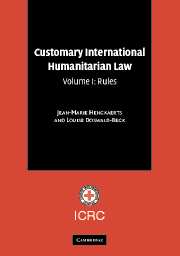Book contents
- Frontmatter
- Contents
- Foreword by ICRC President Jakob Kellenberger
- Foreword by Judge Abdul G. Koroma
- Foreword by Yves Sandoz
- Acknowledgements
- Introduction
- List of abbreviations
- Part I The Principle of Distinction
- Part II Specifically Protected Persons and Objects
- Part III Specific Methods of Warfare
- Chapter 15 Denial of Quarter (Rules 46–48)
- Chapter 16 Destruction and Seizure of Property (Rules 49–52)
- Chapter 17 Starvation and Access to Humanitarian Relief (Rules 53–56)
- Chapter 18 Deception (Rules 57–65)
- Chapter 19 Communication with the Enemy (Rules 66–69)
- Part IV Weapons
- Part V Treatment of Civilians and Persons Hors De Combat
- Part VI Implementation
Chapter 17 - Starvation and Access to Humanitarian Relief (Rules 53–56)
Published online by Cambridge University Press: 05 June 2012
- Frontmatter
- Contents
- Foreword by ICRC President Jakob Kellenberger
- Foreword by Judge Abdul G. Koroma
- Foreword by Yves Sandoz
- Acknowledgements
- Introduction
- List of abbreviations
- Part I The Principle of Distinction
- Part II Specifically Protected Persons and Objects
- Part III Specific Methods of Warfare
- Chapter 15 Denial of Quarter (Rules 46–48)
- Chapter 16 Destruction and Seizure of Property (Rules 49–52)
- Chapter 17 Starvation and Access to Humanitarian Relief (Rules 53–56)
- Chapter 18 Deception (Rules 57–65)
- Chapter 19 Communication with the Enemy (Rules 66–69)
- Part IV Weapons
- Part V Treatment of Civilians and Persons Hors De Combat
- Part VI Implementation
Summary
Rule 53. The use of starvation of the civilian population as a method of warfare is prohibited.
Practice
Volume II, Chapter 17, Section A.
Summary
State practice establishes this rule as a norm of customary international law applicable in both international and non-international armed conflicts.
International armed conflicts
While in 1863 the Lieber Code still stated that “it is lawful to starve the hostile belligerent, armed or unarmed, so that it leads to the speedier subjection of the enemy”, by 1919 the Report of the Commission on Responsibility set up after the First World War listed “deliberate starvation of civilians” as a violation of the laws and customs of war subject to criminal prosecution. The prohibition of starvation as a method of warfare is codified in Article 54(1) of Additional Protocol I. This provision was generally considered new at the time of the adoption of Additional Protocol I but since then has hardened into a rule of customary international law. Under the Statute of the International Criminal Court, “intentionally using starvation of civilians as a method of warfare” is a war crime in international armed conflicts.
The prohibition of starvation is set forth in numerous military manuals. Starvation of civilians as a method of warfare is an offence under the legislation of many States. This rule is also supported by official statements and other practice.
- Type
- Chapter
- Information
- Customary International Humanitarian Law , pp. 186 - 202Publisher: Cambridge University PressPrint publication year: 2005
- 2
- Cited by



